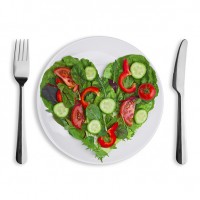

A vegetarian diet can be an extremely healthy dietary choice. Essentially, you are eliminating all meat and fish from your diet, which can be harmful towards your health, both in the short-term and long-term. Meat and seafood do contain nutrients that your body needs to function, however, so it is important for vegetarians to ensure that they are getting enough of these nutrients from other places. It is important to know all of the health benefits and health risks that come with switching to a vegetarian diet, and any potential supplements you will need.
One of the main reasons why people decide to adopt a vegetarian diet is because of the many health benefits. Studies have shown that vegetarians have lower rates of many different health problems, including diverticular disease, constipation, kidney stones, gallstones, some cancers, type 2 diabetes, hypertension, cardiovascular disease, and obesity. The biggest difference between a vegetarian diet and a non-vegetarian diet is the absence of red meat. Studies have linked higher intakes of processed meat and red meat with some types of cancer, cardiovascular disease, gestational diabetes, type 2 diabetes, and obesity. Vegetarian diets also have a lower intake of saturated fat and a higher intake of soluble fiber. Thus, switching to a vegetarian diet has a lot of positive health benefits.
 While switching to a vegetarian diet is certainly a good idea if you are trying to improve your dietary health, there are several mistakes many vegetarians make that can actually lead to health problems. For starters, make sure you are getting your diet information from a reliable source. A poorly-planned vegetarian diet can lead to vitamin deficiencies, such as B12. In fact, a B12 deficiency is incredibly common among the vegetarian population. A long-term deficiency can lead to nerve damage, so it is important to make sure you are getting all of the nutrients you need. A vegetarian diet doesn’t eliminate the snacks from your diet either. If you are still eating cake, chips, and cookies, eliminating red meat from your diet won’t do much for you. You also need to make sure you are getting enough protein. While many people get their protein from chicken and steak, there are many different foods you can eat to keep your protein levels high. Kidney beans, peas, peanut butter, and lentils, for example, are all excellent sources of protein.
While switching to a vegetarian diet is certainly a good idea if you are trying to improve your dietary health, there are several mistakes many vegetarians make that can actually lead to health problems. For starters, make sure you are getting your diet information from a reliable source. A poorly-planned vegetarian diet can lead to vitamin deficiencies, such as B12. In fact, a B12 deficiency is incredibly common among the vegetarian population. A long-term deficiency can lead to nerve damage, so it is important to make sure you are getting all of the nutrients you need. A vegetarian diet doesn’t eliminate the snacks from your diet either. If you are still eating cake, chips, and cookies, eliminating red meat from your diet won’t do much for you. You also need to make sure you are getting enough protein. While many people get their protein from chicken and steak, there are many different foods you can eat to keep your protein levels high. Kidney beans, peas, peanut butter, and lentils, for example, are all excellent sources of protein.
One of the most common problems among vegetarians is a vitamin B12 deficiency. Symptoms of B12 deficiency include tingling in the arms and legs, poor balance, weakness, and anemia. If you are a vegetarian, it is almost certain that you will need to purchase vitamin B12 supplements to avoid becoming deficient. Some vegetarians also suffer from an iron deficiency. The National Institutes for Health suggest that vegetarians get twice as much iron as opposed to non-vegetarians because they are consuming iron that is more difficult to absorb. Thus, it is likely that you will need to take iron supplements to get to this level. Before you make the switch to a vegetarian diet, make sure you read up on all the supplements that you may require.
